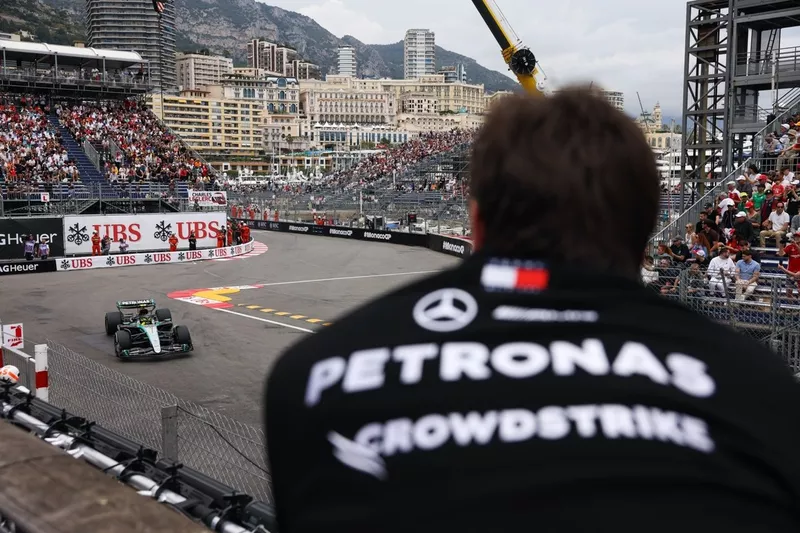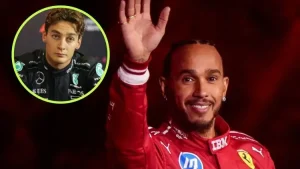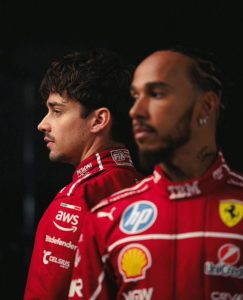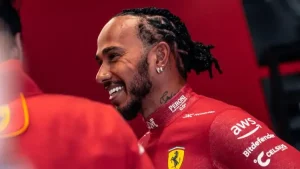BREAKING NEWS: Toto Wolff on Hamilton’s Potential Move to Ferrari

BREAKING NEWS: Toto Wolff on Hamilton’s Potential Move to Ferrari
Toto Wolff, Mercedes’ team principal, recently opened up about why he didn’t try to prevent Lewis Hamilton from considering a move to Ferrari, a shift that would mark a major change in Hamilton’s career and in the Formula 1 world. At the beginning of the year, Hamilton reportedly approached Wolff and shared his intent to potentially end his Mercedes contract early to explore an opportunity with Scuderia Ferrari for the 2025 season. This revelation sparked widespread intrigue and rumors within the Formula 1 community, especially since Hamilton’s bond with Mercedes has been one of the most successful partnerships in the sport’s recent history.
Wolff’s response to Hamilton’s consideration was not to intervene. The Mercedes principal was conscious of the fact that a long-standing relationship between a driver and a team can lose its effectiveness over time, a concept he referred to as “shelf life.” In his view, while strong partnerships can yield incredible success, there eventually comes a point when the relationship risks diminishing returns. Wolff has often spoken about the importance of avoiding stagnation and recognizing when a partnership might have achieved everything it can. This philosophy influenced his decision to avoid persuading Hamilton to stay, despite the shockwaves that a potential departure would send through Mercedes and its supporters.
Hamilton’s discussions with Ferrari and his openness to the idea of joining them brought attention to how dynamic and unpredictable F1 can be, even for seasoned drivers. Although Hamilton and Mercedes have celebrated numerous victories and championships together, Wolff understood that a driver of Hamilton’s caliber and ambition might seek new challenges or a fresh environment. Over the years, Hamilton has established himself not only as one of the sport’s most accomplished drivers but also as a personality with a unique approach to his career trajectory. Wolff seemed to respect Hamilton’s potential interest in pursuing new challenges, even if it meant leaving a successful partnership at Mercedes.
The rumor mill around Hamilton’s potential move to Ferrari was fueled even further by a phone call between Wolff and Carlos Sainz Sr., father of Ferrari driver Carlos Sainz. During the conversation, Sainz Sr. hinted that Ferrari might be making changes to its driver lineup to accommodate Hamilton, suggesting that Sainz Jr. could be leaving the team. Wolff reportedly took this as a clue that Ferrari was positioning itself to bring Hamilton onboard. Sainz’s potential exit from Ferrari raised questions about how the Italian team views its driver lineup and what they might believe Hamilton could bring to their pursuit of championships. This revelation reinforced Wolff’s suspicion that Hamilton was seriously weighing his options outside of Mercedes.
Wolff’s decision to let Hamilton explore other opportunities instead of attempting to persuade him to stay reflects a level of respect for the driver’s ambitions. It also underscores Wolff’s pragmatic approach to managing Mercedes’ future. Though Hamilton has been integral to Mercedes’ success, Wolff’s stance indicates his willingness to prioritize the team’s long-term trajectory over immediate concerns. For Wolff, part of effective team management involves recognizing when a driver’s personal goals might be better served elsewhere. By allowing Hamilton the freedom to contemplate a move, Wolff demonstrated his understanding of how top drivers sometimes need a change of scenery to stay motivated and competitive.
This situation highlights a critical reality within F1: even the most successful partnerships may have an expiration date. Wolff’s approach showcases his belief in the natural lifecycle of professional relationships, where mutual goals align only for so long before one or both parties seek new challenges. His response to Hamilton’s potential departure illustrates his confidence in Mercedes’ ability to remain competitive with or without Hamilton and his readiness to adapt the team’s strategy accordingly.
In sum, Wolff’s handling of Hamilton’s interest in Ferrari reveals a pragmatic and flexible leadership style, focused on what’s best for both the team and the driver. He acknowledges the possibility that Hamilton might feel the urge to test himself in a new environment, despite their shared success at Mercedes. Rather than viewing this as a loss, Wolff seems to appreciate the value of granting Hamilton the space to decide his next steps. Ultimately, Wolff’s approach reflects an understanding of the complexities of Formula 1 partnerships and his commitment to fostering a team culture that prioritizes both success and personal growth, even if it means saying goodbye to a legendary driver.




